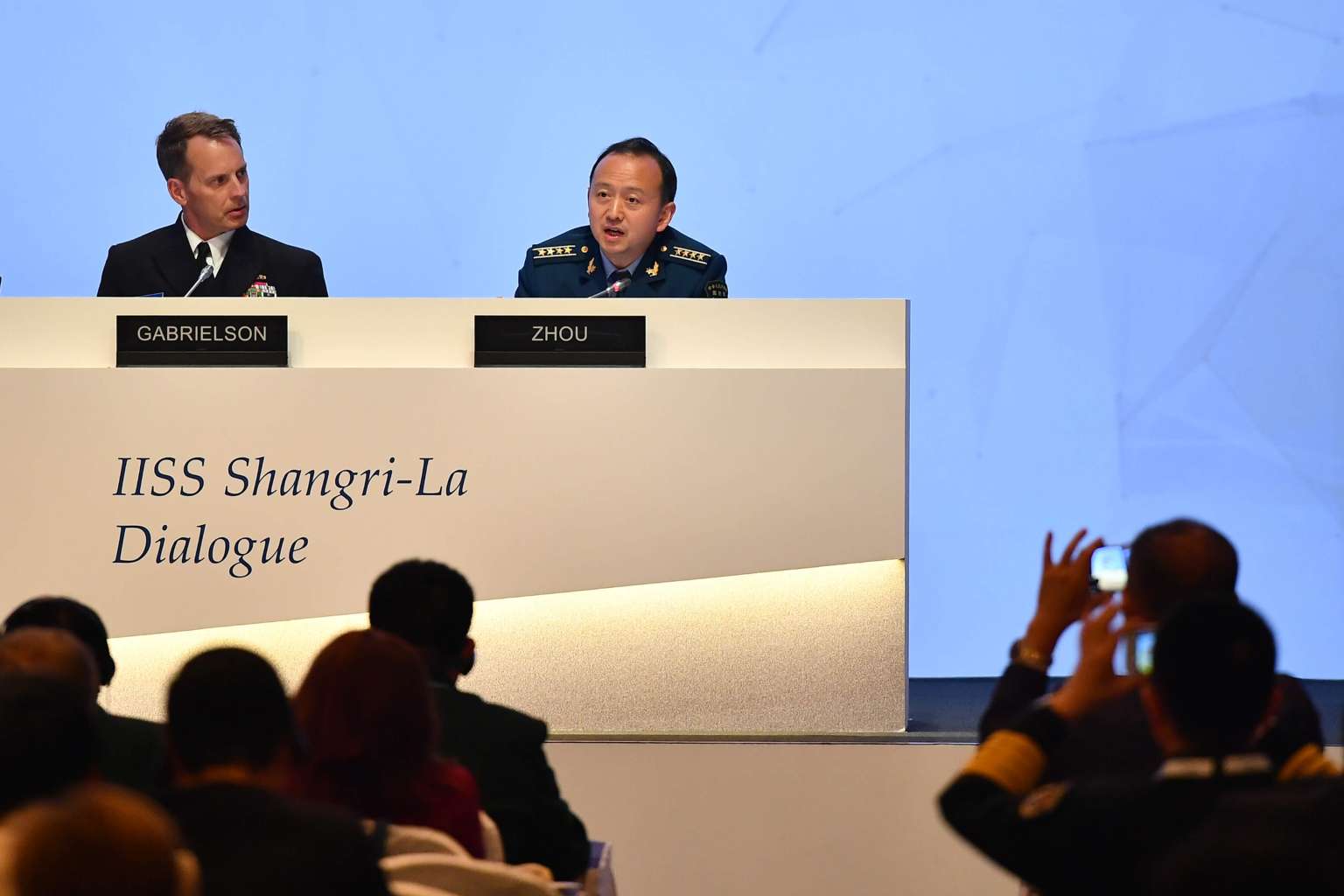China and Asean looking at holding joint maritime exercise next year, senior official says
Sign up now: Get ST's newsletters delivered to your inbox

Rear Admiral Donald D Gabrielson and Senior Colonel Zhou Bo of the People's Liberation Army at IISS Shangri-La Dialogue 2017 on June 3, 2017.
ST PHOTO: LIM YAOHUI
Follow topic:
SINGAPORE - China and Asean are exploring the possibility of holding a joint maritime exercise next year, Senior Colonel Zhou Bo of the People's Liberation Army said on Saturday (June 3).
China proposed such an exercise last year, at the China-Asean Defence Ministers' Informal Meeting in the Laotian capital of Vientiane.
It aims to build mutual trust between China and the regional grouping, several of whose members have competing claims with Beijing in the South China Sea.
Senior Colonel Zhou told a panel at the annual Shangri-La Dialogue that China stands ready to explore the setting up of a China-Asean defence communication link.
The director of the Centre for International Security Cooperation at the Ministry of National Defence said: "We believe all the consultations, dialogues and cooperation have played an important role in promoting maritime security and avoiding maritime conflict."
Senior Colonel Zhou was part of a panel discussing practical measures to avoid conflicts at sea, along with Vietnamese deputy minister of public security Bui Van Nam, the Japan Self-Defence Forces' Kazuaki Sumida, and Singapore-based Donald D Gabrielson of the US Navy.
All stressed the importance of peaceful resolution of disputes and respect for the rule of law. But the session saw a steady barrage of questions aimed at Senior Colonel Zhou, most of them centred around the hotly-contested South China Sea.
Pointing out how an entire chapter in the Asean Charter is dedicated to territorial disputes alone, he said: "It is not fair to highlight the dispute between China and some Asean claimants. Such disputes are found in almost every Asean country with another Asean country."
The current situation in the East and South China Seas are by and large stable, he said, and there is "no realistic threat of a massive conflict at sea" in the Asia-Pacific.
He added that China and Asean claimants all want to resolve their disputes in the South China Sea through friendly negotiations and adherence to international law, without the use or threat of force. Reducing or avoiding military activities at close proximity that could come across as unfriendly or hostile is the most direct and effective way of avoiding a conflict at sea, he added.
There have been maritime and air incidents in Exclusive Economic Zones caused by "certain countries in the name of freedom of navigation", said Senior Colonel Zhu.
About 100,000 ships transit through the South China Sea every year and no country has complained that freedom of navigation of merchant ships is affected, he said.
"It is ludicrous to turn freedom of navigation into an issue and impose one's unilateral understanding of this concept upon others," he said.
In a veiled jab at the US, he added: "We hope those countries who claim that they do not have a position on the issue of the South China Sea and that they do not take sides, don't conduct joint patrols or exercises in sensitive waters to add tension to the situation in the South China Sea."
To a question on the "militarisation" of artificial islands in the South China Sea, where China has been reclaiming land and building military installations, Mr Zhou shot back: "Whn you talk about militarisation, what are you referring to?"
China, he said, is only expanding land it controls.
"We believe this is our legitimate right. It's not a kind of militarisation," said Senior Colonel Zhou.
How would the frequent sailing of US ships in Chinese waters and daily reconnaisance in China's Exclusive Economic Zone be taken then, he retorted.
"Aren't these militarisation? Calling China's (actions) militarisation is just to smear China's reputation," he said. "We in China, in spite of our claim that the islands and adjacent water are Chinese territory, have never threatened to use force against anybody."
In response, Rear Admiral Gabrielson noted: "It's interesting that China says they're not militarising islands that they're adding military equipment to, but the United States is militarising an area that we've been operating in longer than anyone in this room has been alive."

